Does eating before bed cause weight gain?
Not necessarily—eating before bed doesn’t automatically lead to weight gain. So, yes, you CAN throw out that “don’t eat after 7pm” rule!
What matters more is what you’re eating, why you’re eating, and how it fits into your eating habits throughout the day. Weight gain is more likely when nighttime eating becomes a response to emotions, mindless snacking, or consistently eating past fullness—not just because you had a snack after 7 p.m.
Written by Jenn Hand, Holistic Nutritionist, Board Certified Health Coach, NBC-HWC
Is Eating Before Bed Really That Bad for You?
This is one of the most common questions I hear—and one of the ones I was most of afraid of when I was working to heal my own food struggles!
The truth is, the answer is not as straightforward as many diet headlines make it seem. There’s a lot of confusion (and guilt!) around nighttime eating, especially when it comes to weight gain. Some experts say to never eat after 7 p.m., while others say it’s totally fine as long as you stay within your daily calorie needs.
The reality is, whether or not eating before bed affects your weight depends on your overall eating habits, your activity level, your sleep, and why you’re eating at night. Rather than labeling it as “bad,” it’s more helpful to look at the bigger picture and understand what’s driving your evening eating.
Table of Contents
- Common Myths About Late-Night Eating
- How She Overcame the Struggle with Late-Night Emotional Eating
- How Eating at Night May Affect Weight Gain
- The Role of Sleep Quality in Weight Management
- Why Meal Timing and Frequency Matter
- The Link Between Late Eating and Emotional Food Choices
- Does Eating Before Bed Affect Everyone the Same Way?
- When Eating Before Bed Might Be Helpful
- What to Eat Before Bed to Feel Your Best
- Tips to Curb Emotional Late-Night Cravings
- Smart Ways to Plan Your Evening Snack
- Common Questions about Eating at Night
Common Myths About Late-Night Eating
| Myth | Truth |
|---|---|
| Eating at night automatically causes weight gain | Weight gain is caused by consistently eating more calories than you burn—not the time of day. Late-night eating can lead to overeating if you’re tired or emotional. |
| Your metabolism shuts down at night | Your metabolism slows slightly during sleep but stays active—digesting, repairing, and keeping you alive. |
| Carbs at night turn straight into fat | Your body digests carbs the same way regardless of time. Total daily intake and activity level matter more. |
| Late-night eating always means emotional eating | Not always. You might just be hungry from not eating enough earlier. The key is understanding why you’re eating. |
| You should never eat after 7pm | There’s no magic hour. What matters is whether your body needs fuel and what you’re choosing to eat—not the clock. |
How She Overcame the Struggle with Late-Night Emotional Eating
One of my clients, Sarah, came to me frustrated that she couldn’t stop snacking at night—even though she wasn’t always hungry.
Her days were packed with work, parenting, and responsibilities, so by the time evening rolled around, she found herself crashing on the couch with ice cream or chips in hand. No matter many times she told herself, “tonight I swear I won’t eat after dinner!” she broke the promise and again and again. The feelings of failure ate at her.
At first, she tried to avoid eating altogether after dinner, but that only made the cravings worse.
She couldn’t white knuckle for more than an hour (or less!) and she’d end up overeating. Through our work together, she started to untangle the emotional drivers behind her nighttime eating—realizing that food had become her main form of stress relief and “relaxation.”
Instead of trying to eliminate the habit overnight, she added in small, calming rituals like herbal tea, journaling, and short evening walks.
Eventually, she began choosing a nutritious snack when she was physically hungry (and fully allowing it!) and found herself turning to other forms of comfort when the urge was emotional. The transformation didn’t happen because she tried to willpower her way into not eating at night—it happened because she learned to listen to what her body and emotions really needed!
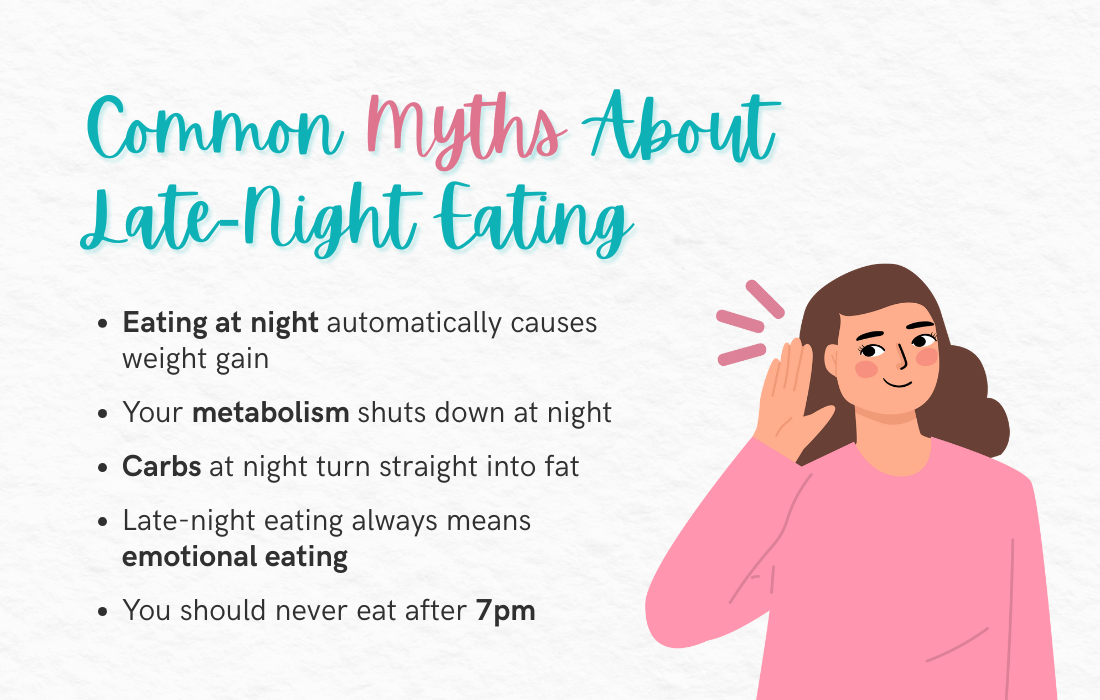
How Eating at Night May Affect Weight Gain
Eating before bed can contribute to weight gain, but it really depends on your overall habits, so don’t panic!
If you end up bingeing or overeating at night, it can impact weight over time, but when we’re eating in a balanced way, eating at night shouldn’t affect weight.
But if you’re honoring true hunger with a balanced snack, it’s unlikely to derail your progress. Lifestyle factors like stress, how active you are, and what your meals look like during the day all play a role.
The Role of Sleep Quality in Weight Management
Eating too close to bedtime can disrupt your sleep, especially if meals are heavy or high in sugar.
Poor sleep affects hormones like ghrelin and leptin, which regulate hunger and fullness. This can lead to increased cravings, especially for carbs and sweets, the next day.
But on the positive side, 7-9 hours of sleep a night can support your metabolism and hunger regulation, helping you make better food choices and manage weight more effectively!
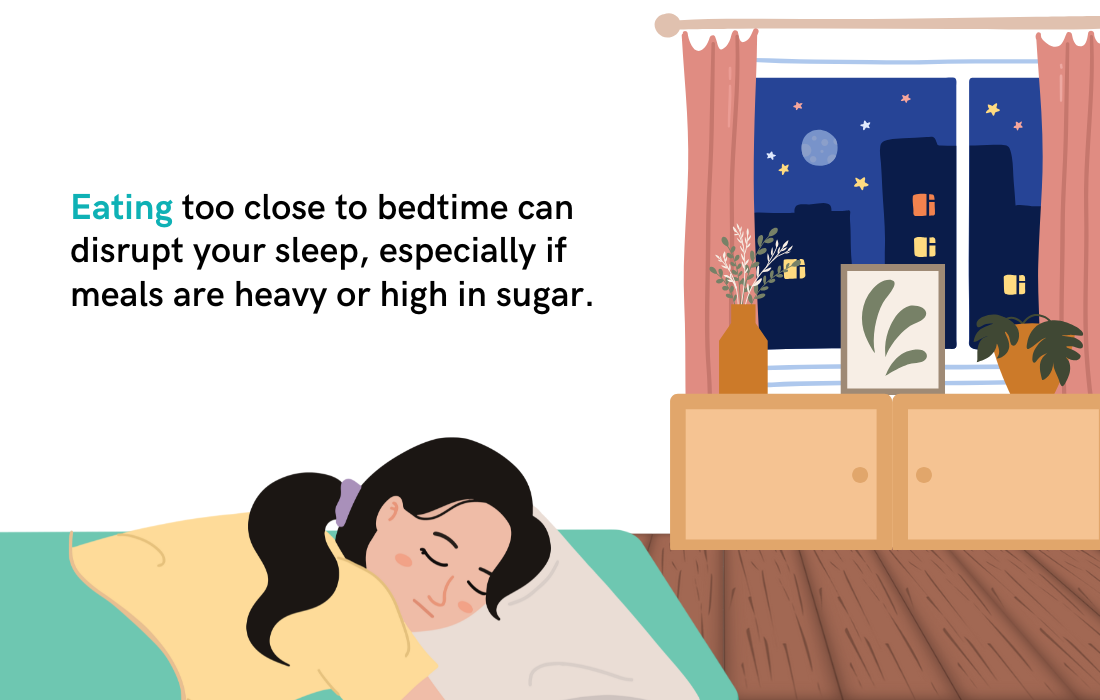
Why Meal Timing and Frequency Matter
My go-to general cadence of eating is 3-4 hours.
Since irregular meal timing or skipping meals can throw off your hunger cues and lead to overeating later in the day, eating regularly helps keep you balanced! When you are consistent in your meals/snacks, your body begins to trust it will be fed and relaxes into the rhythm of steady fuel.
Plus it can keep your metabolism steady and prevent intense nighttime hunger.
It’s not about eating on a strict schedule, but more about finding a rhythm that supports your body’s needs (this is why the 3-4 hour timeframe can be a good place to start!)
🌷 Related Post: Can I Eat Whatever I Want and Still Lose Weight?
The Link Between Late Eating and Emotional Food Choices
Late-night eating can be triggered by boredom, stress, or loneliness. At night, we’re more likely to seek comfort, soothing, reward or get our “alone time fix” via food.
On top of that, when we’re tired or drained, we’re more likely to reach for chips, sweets, or whatever’s easy and comforting. These less intentional food choices can contribute to weight gain over time.
Learning how to deal with emotions (things like journaling, coaching, therapy, breathing techniques, meditation, etc) can help you deal with the feeling that comes up in the moment without turning to food.
🌷 Related Post: The Biggest Cause of Overeating at Night
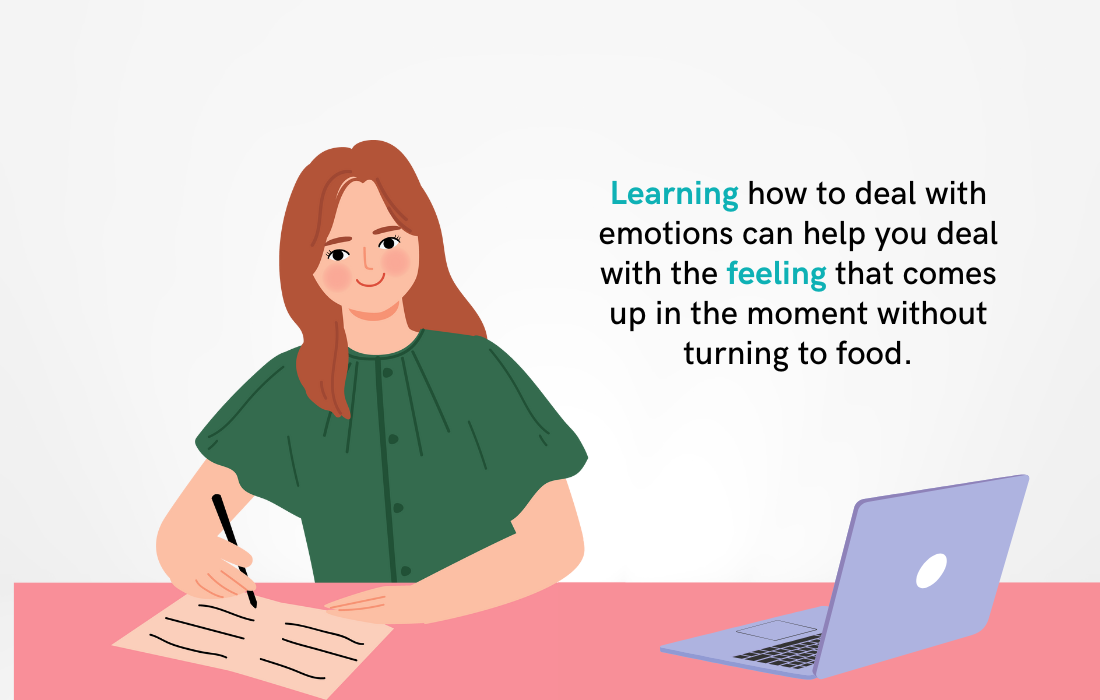
Does Eating Before Bed Affect Everyone the Same Way?
Not at all—everyone’s body responds differently.
Factors like age, hormone levels, activity level, and overall health can all impact how nighttime eating affects your weight. That’s why tuning in to your own body’s patterns is so much more helpful than following one-size-fits-all rules.
When Eating Before Bed Might Be Helpful
When I struggled with dieting and bingeing, I had a hard rule I tried to maintain: don’t eat after 7pm. I was afraid I’d gain weight if I ate after 7.
The reality was that sometimes I WAS hungry after 7 and when I attempted to force myself to NOT eat, it always backfired. I’d either wake up in the middle of the night starving or end up bingeing before bed.
In some cases, a small snack before bed can actually support better sleep and stabilize blood sugar through the night.
This is especially helpful if you had an early dinner, exercised in the evening, or are prone to waking up hungry. Think something simple like Greek yogurt, a banana with peanut butter, or a slice of toast with almond butter.
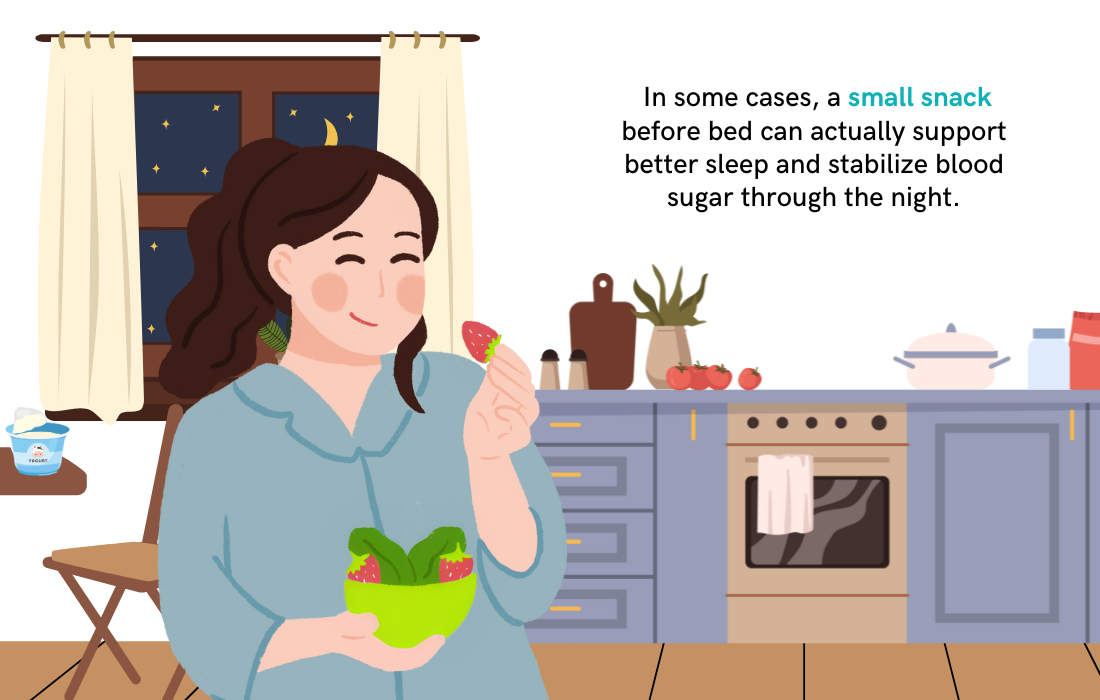
What to Eat Before Bed to Feel Your Best
Here are some simple, balanced snack ideas for what to eat before bed to feel your best and avoid weight gain:
- Greek yogurt with a few berries – calming protein with a touch of natural sweetness
- Banana with almond butter – magnesium and healthy fats to help relax your body
- Small bowl of oatmeal with cinnamon – soothing, warm, and good for blood sugar stability
- Hard-boiled egg and a few whole grain crackers – easy-to-digest protein and complex carbs
- Cottage cheese with sliced fruit – slow-digesting protein with gentle natural sugar
- Chamomile tea and a few walnuts – promotes relaxation
- Hummus and cucumber slices – light but satisfying combo of protein, fiber, and crunch
- Rice cake with avocado – calming carbs with healthy fats for fullness without heaviness
- Warm almond milk with a pinch of nutmeg – classic sleepy-time drink
Tips to Curb Emotional Late-Night Cravings
Emotional cravings often arise when we’re stressed, bored, or feeling anxious.
The first step to curbing them is recognizing the emotional trigger rather than simply reaching for food. When you’re feeling a craving coming on, try taking a few deep breaths, going for a walk, or doing something relaxing like reading or journaling.
I always say journaling is like free therapy! It can help take the swirling chaos in your mind and make sense of it on paper.
If you’re truly hungry, choose a healthy snack that will nourish your body, such as an apple with almond butter or a handful of nuts. One thing I often reminded myself (and tell my clients!) is to make sure you eat enough during the day. Restricting or trying to be really “good” throughout the day usually backfires at night.
Make sure you eat regularly and often, are getting enough protein each time you eat and find what you’re eating satisfying (i.e. you eat things you actually like!)
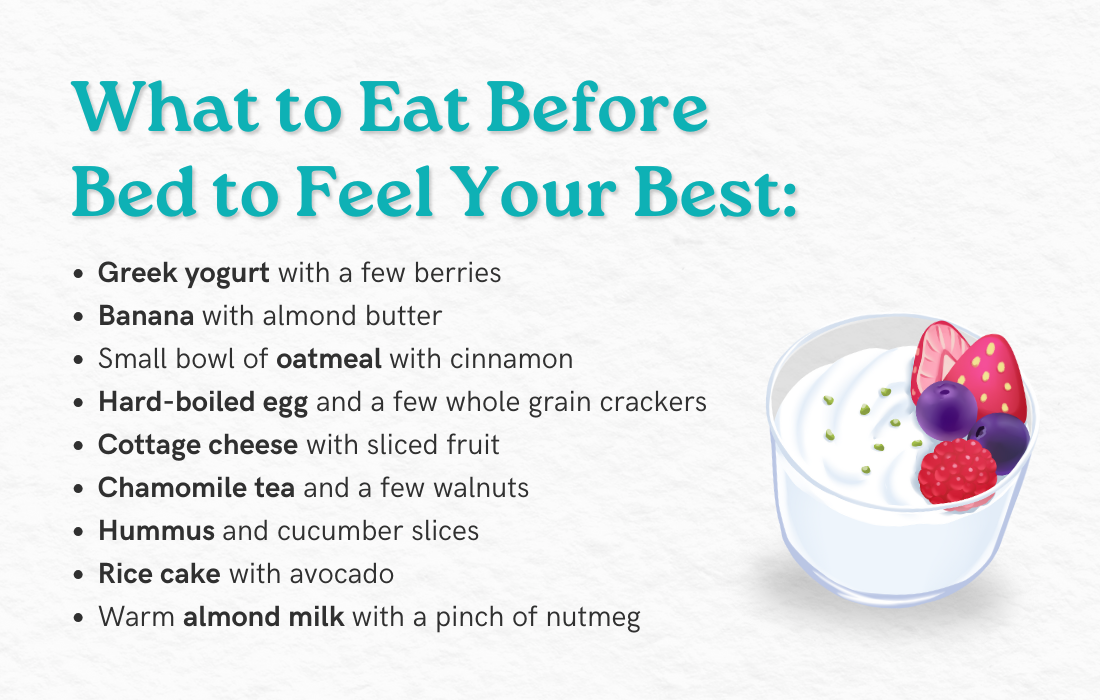
Smart Ways to Plan Your Evening Snack
Provide easy strategies for planning ahead so bedtime snacks support overall health goals.
When it comes to evening snacks, planning ahead can be really helpful! I often work with clients to plan in snacks for the evenings, depending on where their trouble spots are during the day.
If you usually end up overeating at night, can you plan in something that you look forward to to allow yourself to have if needed?
Stock up on nutritious and satisfying food options that can help satisfy your hunger without derailing your progress—think protein-rich snacks like greek yogurt with honey and fruit, a protein bar you enjoy, a piece of Eziekal bread with peanut butter, or some egg salad on toast.
Preparing a snack in advance can help you avoid eating impulsively when you’re tired or distracted.
Aim for a combination of protein, healthy fats, and fiber, which can help regulate blood sugar and keep you full throughout the night. If you know you tend to get hungry late, have a few go-to snacks on hand so you’re not left with tempting, less-nutritious options. This small step makes it easier to stay on track with your goals and supports overall health.
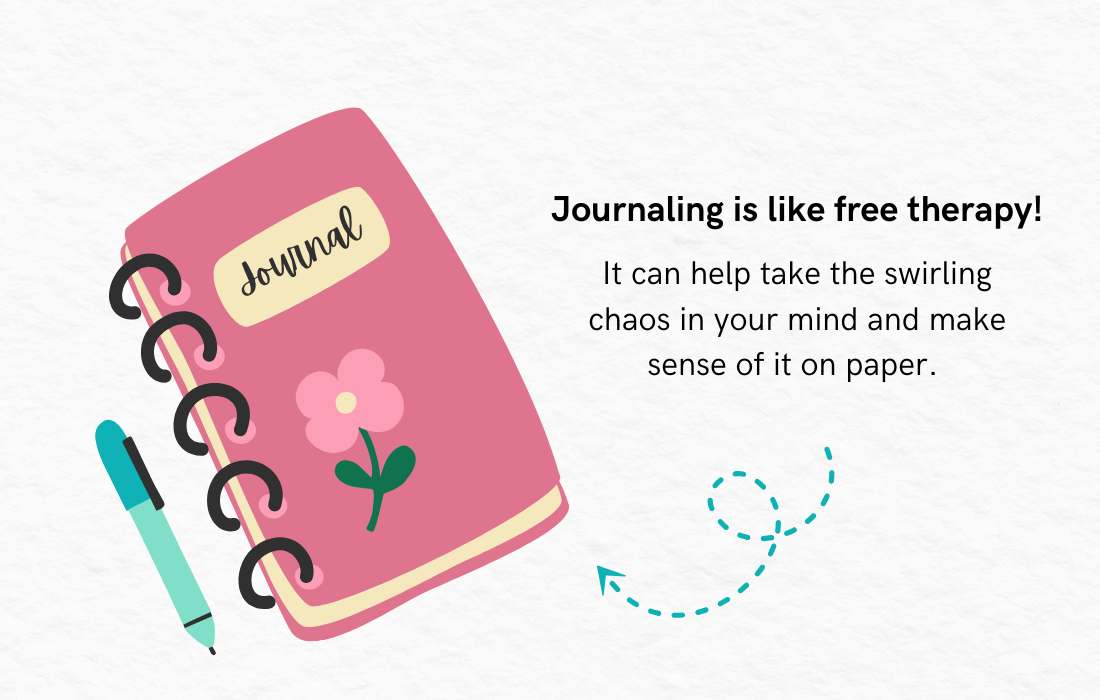
Common Questions about Eating at Night
What is the best time to have my evening meal?
Honor your body! The best time is whenever works for your body and schedule—what matters most is honoring your hunger, not the clock. When are you hungry? Plan your evening meal around that!
Why do I get strong sugar or junk food cravings late at night?
These cravings often come from undereating during the day, emotional stressors (boredom, ansty-ness, etc,) or a rebellion from having too many food rules. Creating more structure and satisfaction in your meals can help reduce nighttime urges.
Is it better to eat a small snack or go to bed hungry?
It’s better to have a nourishing snack if you’re hungry—going to bed hungry can lead to sleep disruptions and stronger cravings the next day. A small, balanced snack can actually support better rest and overall well-being.
Does sleeping right after eating prevent weight loss?
No, weight gain or loss depends more on your overall habits and patterns, not the exact timing of when you eat. Listening to your body’s hunger and fullness cues is more impactful than avoiding food before bed.
Can sleep deprivation lead to weight gain?
Yes, poor sleep can affect hunger hormones and increase cravings, making it harder to make balanced food choices. Prioritizing rest is an often-overlooked piece of a healthy relationship with food.
Is it better to eat high calorie foods in the morning?
It depends on your body and hunger cues—there’s no one-size-fits-all rule, and what matters most is how your meals feel and fuel you. Some people feel more satisfied spacing out higher-energy foods throughout the day.
Related Articles
⚪ Why You’re Not Losing Weight on Ozempic (and What to Do Instead)
⚪ How to Stop Obsessing Over Food and Weight
⚪ Food Relationship Coach: How Coaching Can Help You Find Food Freedom
Get the Normal Eater’s Newsletter
Join 8000+ women who are overcoming overeating, binge eating, and breaking up with dieting forever. Get Jenn’s inspiring and actionable weekly newsletter with the latest posts, podcasts, and tips on how to love your body, find food freedom, and lose weight holistically.
Get the Normal Eater’s NewsletterWork with an Emotional Eating & Holistic Nutrition Coach
Overcome Bingeing and Emotional Eating and Break Up with Yo-yo Dieting
Working with an emotional eating coach and holistic nutritionist can help you get free from the frustrating binge and restrict cycle and stop yo-yo dieting.
You don’t have to be obsessed with food or have a million rules around eating to find your natural weight and learn to love your body. Ready to actually see a lasting change and experience true freedom?
Schedule a 20-min CallAbout the Author:

Jenn Hand has been helping women like you become normal eaters since 2015.
She’s worked with thousands of women, helping them to balance their bodies, end bingeing, stop obsessing over food, and start feeling amazing again. As a board-certified health coach and holistic nutritionist, Jenn knows how to support you in making real positive changes that last.
Her articles have been published on Mind Body Green, Tiny Buddha, Thrive Global and other local and global media platforms. She’s the author of How to Be a Normal Eater and the creator of The Normal Eater’s Club program. Listen to Jenn’s advice and tips on the Cake Doesn’t Count Podcast, or read more of her articles for free on the Food Freedom Blog.
Learn About Coaching!




